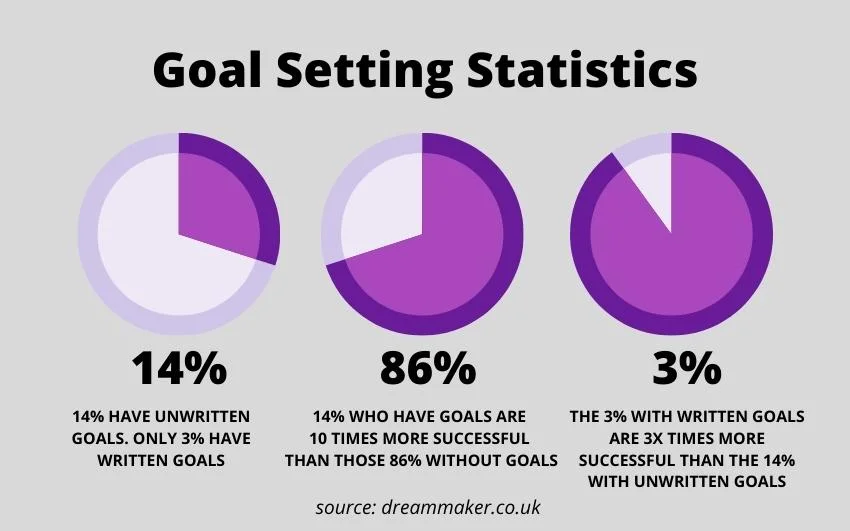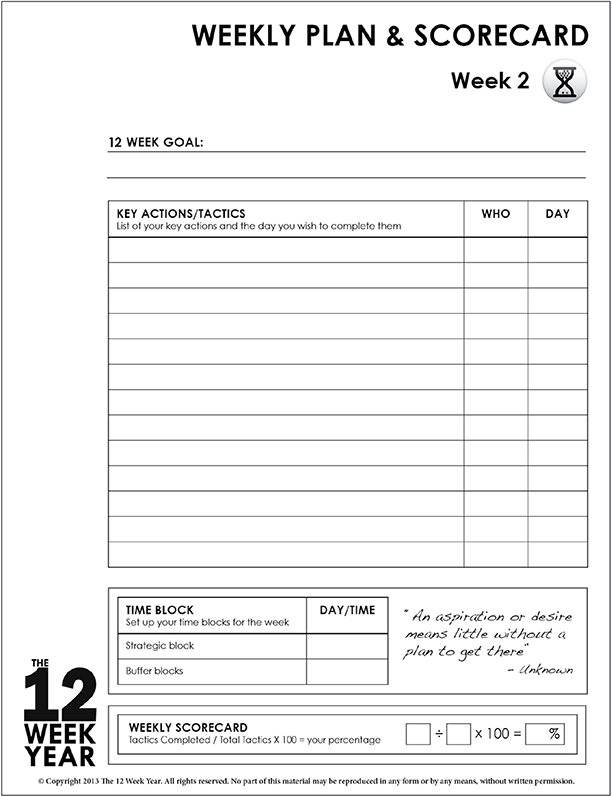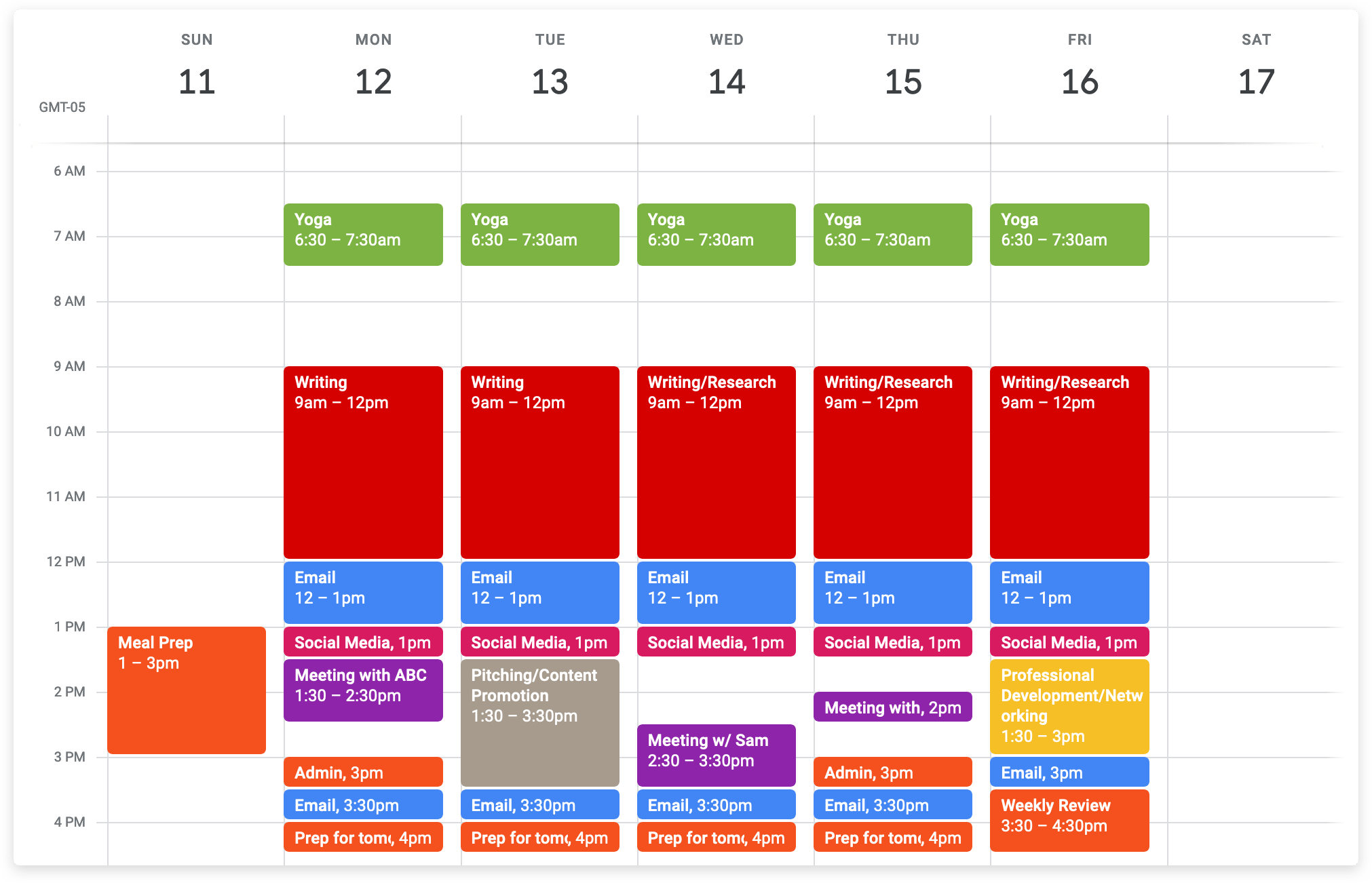
Menu

Imagine transforming your entire year’s worth of goals into achievements in just 12 weeks. Sounds too good to be true? It’s not a magic trick or a lofty promise; it’s the groundbreaking methodology of the “12 Week Year” by Brian P. Moran and Michael Lennington. This revolutionary system redefines the concept of a ‘year’ to 12 weeks, turning traditional annual planning on its head and supercharging productivity and focus.
In today’s fast-paced world, the quest for productivity hacks and effective goal-setting strategies is unending. We all are on the lookout for that silver bullet that will propel us towards our dreams faster and more efficiently.
Enter the “12 Week Year” system, a game-changer in how we approach our personal and professional goals. Unlike the slow and often unproductive pace of annual goal-setting, the 12 Week Year teaches you to operate with the urgency and clarity of having only 12 weeks to achieve what you normally would in 12 months.
It’s had such a huge impact on my life that I want to share with you how to use this system yourself. Whether you’re looking to skyrocket your career, elevate your personal life, or simply get more done in less time, keep reading!
The “12 Week Year” is not just a productivity system; it’s a radical shift in how we think about time management and goal achievement. Coined by Brian P. Moran and Michael Lennington, this concept redefines the traditional calendar year, breaking it down into more manageable, highly focused 12-week periods.
Instead of setting annual goals that often get lost in the day-to-day grind, the “12 Week Year” encourages you to envision what you can accomplish in just 12 weeks, essentially treating each quarter as its own “year.” At its core, the “12 Week Year” is built on the premise that shorter time frames instill a sense of urgency and clarity that yearly planning lacks.
Think about it: how many times have you set New Year’s resolutions only to find yourself off track by February? This system aims to eliminate the procrastination and lack of focus that often accompany the traditional 12-month cycle. By narrowing your vision to 12 weeks, you not only set more realistic and immediate goals but also create a powerful, consistent cycle of execution and review.
It’s proven that just setting goals makes you 10 times more likely to achieve them than the 86% of people who don’t at all. While having goals is a big step, it’s even more important to have a system in place to achieve them. Hence, the inspiration of me writing this article.

The beauty of the “12 Week Year” lies in its simplicity and adaptability. It’s not about doing more in less time; it’s about doing the right things effectively. This methodology applies to anyone looking to improve their productivity, whether you’re a student, a professional, an entrepreneur, or simply someone aspiring to achieve personal goals.
What sets the “12 Week Year” apart is its focus on execution and accountability. It’s one thing to set goals; it’s another to follow through with them. This system incorporates regular planning and review sessions to keep you on track, along with strategies for overcoming obstacles and staying motivated. By breaking down your annual goals into 12-week segments, you’ll find yourself achieving more in three months than most do in an entire year.
In essence, the “12 Week Year” is about changing how you view time and goal setting. It challenges the status quo of annual planning and offers a more agile, effective way to achieve success. Whether you’re aiming to skyrocket your career, transform your personal life, or simply get more done in less time, adopting the “12 Week Year” approach could be the catalyst you need to make those aspirations a reality.
The “12 Week Year” system has revolutionized the way I approach my goals and manage my time. It’s not just a methodology; it’s a mindset shift that has brought about significant benefits in both my personal and professional life. Let me walk you through the advantages I’ve experienced since implementing this system, which might just inspire you to give it a try.
One of the most immediate benefits of the “12 Week Year” is how it sharpens your focus. By narrowing your goal-setting and execution timeline to just 12 weeks, every task and action takes on new urgency and importance. This condensed timeframe eliminates the all-too-common “I’ll do it later” mentality, pushing you to prioritize what truly matters. It’s like putting on a pair of glasses that suddenly brings your goals into crystal clear focus, allowing you to zero in on what will make the most significant impact.
The “12 Week Year” has been a game-changer for my productivity. Traditional annual planning can lead to procrastination and a lack of consistent effort. However, with the 12-week cycle, I’ve found myself more motivated to make progress every day. The system encourages regular review and adjustment, which means I’m not just blindly following a plan; I’m actively refining my approach to stay on the most efficient path towards my goals. This dynamic planning process has led to achieving more in three months than I used to in a year.
Breaking down my annual goals into 12-week chunks has made everything seem more achievable. Instead of being overwhelmed by a distant, year-end target, I now set shorter-term goals that are directly tied to my larger vision. This approach has transformed my goal-setting from a daunting task into a series of manageable steps. Each 12-week “year” provides a fresh start, a chance to celebrate successes, learn from setbacks, and adjust strategies as needed.
Life is unpredictable, and the “12 Week Year” system embraces this reality by offering unmatched flexibility. The shorter planning cycles allow me to adapt to changes quickly, whether they’re unexpected opportunities or challenges. Instead of being locked into a rigid annual plan, I can pivot as needed, reassessing my goals and strategies every three months. This adaptability has been crucial in maintaining progress, no matter what life throws my way.
Finally, the “12 Week Year” has instilled a strong sense of accountability in me. With weekly planning and review sessions, I’m constantly evaluating my progress and holding myself responsible for my actions (or lack thereof). This system encourages setting up accountability partnerships, which has been incredibly motivating. Knowing that someone else is aware of my goals and will check in on my progress adds an extra layer of commitment to the process.
Diving into the “12 Week Year” system, I quickly realized it was more than just a time management strategy; it was a comprehensive approach to goal achievement, grounded in five core principles. These principles have not only reshaped my workflow but have also provided a solid foundation for personal growth and success. Let me share these core principles with you, which might just be the missing pieces in your productivity puzzle.
The journey of the “12 Week Year” begins with Vision. It’s about defining a compelling future that excites and motivates you. For me, crafting a clear vision was like setting my personal GPS; it gave direction to my efforts and decisions. This vision isn’t just a dream; it’s a detailed picture of where I want to be, influencing my daily actions and guiding my 12-week plans. Remember, a vision without action is merely a dream, but a vision with action can change your life.
With my vision in place, the next step was Planning. This principle is about breaking down your vision into actionable steps. What I love about the “12 Week Year” planning process is its emphasis on specificity and achievability. Each plan is a roadmap for the next 12 weeks, detailing what needs to be done, when, and how. This isn’t about vague intentions; it’s about creating a clear, step-by-step guide to turn your vision into reality.
Process Control is the principle that keeps everything on track. It involves establishing routines and using tools to manage time, track progress, and stay focused. For me, implementing process controls was like setting up guardrails on my path to success; they helped me avoid distractions and maintain momentum. Whether it’s time blocking or using a project management app, process control ensures that my daily actions align with my overall plan.
The principle of Scorekeeping is straightforward but powerful. It’s about measuring your progress towards your goals. In my experience, what gets measured gets done. Keeping score has allowed me to see exactly where I stand in relation to my goals at any given time. This regular feedback loop is crucial for motivation and helps me adjust my actions as needed. It turns out, tracking progress is not just about numbers; it’s about creating a tangible sense of achievement and momentum.
Here’s an example of a scorecard that people use to measure their productivity and tasks during each week. Without this kind of tracking, you won’t really know how well you’re doing or be able to hold yourself accountable.

Which, brings me to my next point.
Lastly, the accountability aspect is powerful for keeping you on track. This principle is about owning your actions and results. It means being answerable not just to myself, but also to someone else, like a coach, mentor, or accountability partner. Sharing my goals and progress with someone else has significantly increased my commitment and consistency. Accountability isn’t about external pressure; it’s about building a support system that encourages and challenges you to reach your highest potential.
Implementing the “12 Week Year” has been a transformative journey for me, reshaping how I approach my goals and manage my time. If you’re ready to kickstart this journey for yourself, let me guide you through the step-by-step process that helped me make the most out of every 12-week cycle. By following these steps, you’ll be on your way to achieving more in 12 weeks than most do in 12 months.
First things first, define your vision. What do you want to achieve in the next 12 weeks, and how does this align with your longer-term aspirations? For me, setting a clear and compelling vision was crucial. It served as my North Star, guiding my actions and decisions. Take the time to visualize where you want to be and what achieving your goals will feel like. This vision will fuel your motivation and keep you focused.
With your vision in place, it’s time to set specific, achievable goals. These should be clear, measurable, and directly tied to your vision. I found that breaking down my overarching vision into smaller, actionable goals made them feel more attainable. Remember, your goals for the 12 weeks should challenge you but also be realistic enough to achieve within the timeframe.
Now, craft a plan that outlines how you’ll achieve your goals. This involves breaking down each goal into tasks and allocating them across the 12 weeks. For me, creating a week-by-week plan made a huge difference. It allowed me to see exactly what needed to be done and when. Be sure to prioritize your tasks and include milestones to track your progress.
One of the most effective strategies I adopted from the “12 Week Year” is time blocking. It’s about dedicating specific blocks of time to your most important tasks. This technique helped me focus on what needed to be done without getting overwhelmed by distractions. Schedule your tasks based on priority and energy levels, ensuring that you’re working on the right thing at the right time.

Keeping score is essential for tracking your progress and staying motivated. I set up a simple scoring system where I rated my performance each week. This wasn’t about being perfect; it was about honest reflection on what I accomplished and where I could improve. Seeing my progress visually each week was incredibly motivating and helped me adjust my actions as needed.
The weekly review and planning session became a cornerstone of my “12 Week Year.” Every week, I took time to review my progress, celebrate wins, and identify areas for improvement. Then, I planned my actions for the coming week. This routine ensured that I stayed on track and made consistent progress towards my goals.
Finally, accountability has been key to my success with the “12 Week Year.” Whether it’s a mentor, a coach, or an accountability partner, having someone to share your goals and progress with can significantly boost your commitment. For me, regular check-ins with my accountability partner kept me motivated and focused, especially when challenges arose.
Embarking on the “12 Week Year” journey has been nothing short of transformative for me, but it wasn’t without its hurdles. Like any worthwhile endeavor, adopting this system presented a few challenges.
However, with each challenge came a valuable lesson and a strategy to overcome it. Let me share some common challenges I faced and the solutions that helped me navigate through them, turning obstacles into stepping stones towards my goals.
Initially, the intensity of the “12 Week Year” caught me off guard. The pressure to achieve more in less time can lead to overwhelm and even burnout if not managed properly.
Solution: The key for me was learning to prioritize ruthlessly and accept that not everything has to be done at once. By focusing on the most impactful tasks and allowing for adequate rest, I found a sustainable rhythm. Remember, the goal is not just productivity but also well-being.
There were times when my focus wavered, and my motivation dipped, especially when progress seemed slow or when faced with setbacks.
Solution: Revisiting my vision and goals helped reignite my motivation. I also learned the importance of celebrating small wins along the way. These moments of recognition fueled my drive and reminded me why I started.
Even with a clear plan, procrastination found its way into my routine, threatening to derail my progress.
Solution: Setting shorter, more immediate deadlines within the 12-week frame was a game-changer. Breaking tasks into smaller, more manageable actions made starting less daunting and helped build momentum.
In the beginning, I underestimated the power of accountability. Trying to go at it alone made the journey tougher and lonelier.
Solution: Finding an accountability partner transformed my experience. Regular check-ins provided both the support and the gentle nudge I needed to stay on course. Don’t underestimate the power of shared goals and mutual encouragement.
Life is unpredictable, and unexpected events threatened to throw off my carefully laid plans.
Solution: Flexibility became my best ally. I learned to adapt my plans, embrace change, and pivot as necessary. The “12 Week Year” is about progress, not perfection. Being adaptable ensures that you keep moving forward, no matter what.
If you want to take your goals and success to the next level, I can’t recommend this book and system enough. It’s been a game changer for myself, and I’m sure you’ll see how powerful it is for yourself when you implement it.
As you embark on your journey, keep in mind that the path to success is a series of small, consistent steps. It’s about progress, not perfection. Embrace the challenges as opportunities for growth, celebrate your wins, no matter how small, and always keep your vision in sight.
I suggest buying the book itself and visiting the official website I shared at the beginning of this article. Take the time to study and implement it, and I look forward to hearing how you are enjoying it!

Carmine Mastropierro is a self-development coach who helps people become the best version of themselves. He also teaches marketing and entrepreneurship on his other website.